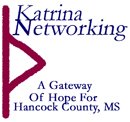Fed Trick - Grant $ For SBA Loan
By Bill Walsh
Washington bureau
WASHINGTON - Linda Ireland figured that whatever money she got from Louisiana's long-awaited Road Home disaster grant program could be used to rebuild her flooded-out New Orleans house.
Ireland was stunned to discover recently that a big chunk of her Road Home grant could very well be taking a road straight back to Washington, D.C.
By law, disaster victims are prohibited from receiving multiple sources of financial aid for the same purpose. So Ireland's rebuilding grant - along with those of untold numbers of other flood victims in Louisiana and Mississippi - may have to be used to pay off all or a portion of her disaster loan from the Small Business Administration.
The requirement, which has caught some homeowners by surprise, is being challenged by the Louisiana Recovery Authority. In the meantime, however, it has sent homeowners such as Ireland racing back to their calculators to see if they will have enough to rebuild.
"I was like filling up a bucket with insurance money I had left, my SBA loan and my Road Home grant. I needed all of that money," said Ireland, whose Broadmoor home was a total loss when the levees broke last year. "If Road Home goes to the SBA to pay off my loan, that's nice. But then I don't have enough to rebuild."
To help Gulf Coast homeowners recover from the costliest disaster in American history, the federal government has made two major sources of financing available. Through the Small Business Administration, 94,437 low-interest disaster loans have been approved in Louisiana totaling $6.7 billion. Over the past year, Congress also approved $12 billion in block grant money, the bulk of which was earmarked for Louisiana's Road Home program to compensate homeowners.
According to the SBA, to allow disaster victims to use both sources of financing to rebuild the same house could very well violate federal laws that prohibit "duplication of benefits." "They would have a subsidized loan and a grant," said Herb Mitchell, director of SBA's disaster loan program. "They would be overcompensated."
Mitchell said Road Home grants don't always have to be used to pay back SBA loans. He said the key element is the value of the loss.
For example, he said, if a house received $350,000 in uninsured damage and a homeowner received a $100,000 SBA loan and a $100,000 Road Home grant, the grant would not have to be used to pay down the loan because the borrower would still have $150,000 in uncompensated losses. I
f, however, the damage was $200,000, the SBA loan was $150,000 and the Road Home grant was $100,000, $50,000 of the grant would have to be used to pay down the loan.
Loans given out for other purposes, such as covering the contents of a flooded house, would not have to be paid back with a grant designed for rebuilding. Also, only that portion of an SBA loan that has been disbursed needs to be paid back.
The SBA said that all of the details were spelled out in a memorandum of understanding signed between the agency and the State of Louisiana.
However, Andy Kopplin, executive director of the Louisiana Recovery Authority, said he sees some flexibility.
Kopplin said that because an SBA loans has to be repaid and a Road Home grant doesn't, they should not be considered duplicative under the law. He said the LRA has been urging the SBA for months to change its interpretation.
"This is not a state decision. This is an SBA decision about what they require under the rules," Kopplin said. "Our grants are capped at $150,000 and in some cases that will not cover all of the costs that the homeowners may face."
Kopplin said that the only portion of the SBA loan that should have to be covered by grant money is the benefit from the reduced interest rate. At 2.67 percent, the SBA loans are far below what homeowners could get privately.
"To the extent that the interest rate subsidy is a duplication of benefits, the loan could be reduced," Kopplin said.
Sen. Mary Landrieu, D-La., added her voice to the dispute this week with a letter to SBA Administrator Steven Preston seeking clarification of the agency's position. She said that the restriction could slow down the progress of the recovery in Louisiana and an aide said legislation to change the federal rules could be offered.
"These homeowners are extremely concerned that federal regulations are impeding their return to their communities," Landrieu said in the letter.
For homeowners still trying to chart their plans more than a year after Katrina hit, the dust-up has added just one more layer of uncertainty.
Ireland has received damage estimates on her Broadmoor home ranging from $80,000 to $300,000. She has been approved for a $120,000 SBA loan. Now, she is waiting to see how much she will get through the Road Home program to figure out how she will finance her rebuilding.
"I don't want to double dip, but the emphasis right along has been in filling the gap and making people whole," Ireland said.
When asked how she will come up with the balance of the money if she falls short, she said, "Maybe I can borrow from the credit union or family members if I need more. It's been so sketchy about what will happen."
Bill Walsh can be reached at bill.walsh@newhouse.com


1 Comments:
Good to read about something like this.
Thank you so much for sharing the same.
Post a Comment
<< Home